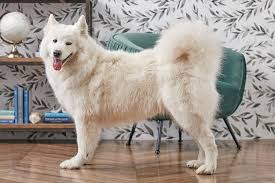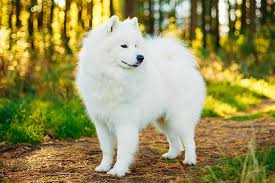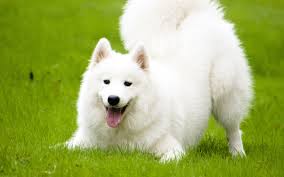The Samoyed is a breed of dog that originated in Siberia. They were originally bred by the Samoyede people for herding reindeer and pulling sleds. Samoyeds are medium-sized dogs with thick, fluffy white coats that were developed to keep them warm in the harsh Siberian climate.
Samoyeds are known for their friendly and sociable personalities. They are generally good with children and other pets, and they love to be around their human family. They are also very intelligent and trainable, making them great candidates for obedience and agility training.
One thing to keep in mind if you are considering getting a Samoyed is their grooming needs. Their thick coats require regular brushing to prevent matting and keep them looking their best. Samoyeds also shed quite a bit, so be prepared to do some extra cleaning around the house.
Read Also: Prevention and Methods of Controlling Coccidiosis among Chickens
History and Origin of the Samoyed Dog Breed

The Samoyed is a breed of dog that originated in Siberia, specifically in the northwestern part of Russia, near the Arctic Circle. They were originally bred by the Samoyede people, a semi-nomadic tribe of reindeer herders who relied heavily on their dogs for survival.
The Samoyede people, who are believed to be the oldest indigenous people of Siberia, used the Samoyed dogs for a variety of tasks, including herding reindeer, guarding their camps, and pulling sleds. The dogs were also used for hunting, particularly for catching small game like squirrels and hares.
It is believed that the Samoyede people first began breeding the Samoyed dogs more than 1,000 years ago. The breed was developed to be sturdy and adaptable, able to withstand the harsh Siberian climate and work in a variety of roles. Over time, the Samoyede people refined the breed to be the fluffy, friendly dogs we know and love today.
The Samoyed’s thick, fluffy coat was a crucial part of their survival in Siberia. The coat served as insulation, keeping the dogs warm in the bitter cold. It also protected them from the elements, including snow and wind. The Samoyede people took great pride in their dogs’ coats, and would often decorate them with colorful ribbons and other adornments.
In the late 1800s, the Samoyed breed was introduced to Europe by explorers and traders. The first Samoyeds were brought to England in 1889 by a wealthy British explorer named Ernest Kilburn-Scott. Kilburn-Scott fell in love with the breed during his travels in Siberia, and was determined to bring a pair of Samoyeds back to England with him.
The Samoyed quickly became popular in England and other parts of Europe, thanks in part to their friendly personalities and striking appearance. In 1906, the Samoyed Club of America was founded, and the breed was officially recognized by the American Kennel Club in 1907.
Today, the Samoyed remains a beloved breed of dog around the world. They are known for their friendly and sociable personalities, as well as their love of children and other animals. Samoyeds are also highly intelligent and trainable, making them popular choices for obedience and agility competitions.
Of course, owning a Samoyed does come with its challenges. Their thick coats require regular grooming to prevent matting and keep them looking their best. Samoyeds also shed quite a bit, so be prepared to do some extra cleaning around the house. But for those who are willing to put in the time and effort, the rewards of owning a Samoyed are immeasurable.
So there you have it, a brief history of the Samoyed dog breed. From their origins as working dogs in Siberia to their status as beloved pets around the world, the Samoyed has come a long way over the centuries. Whether you’re a fan of their fluffy coats or their friendly personalities (or both!), there’s no denying that the Samoyed is one of the most special dog breeds out there.
Appearance and Size of Samoyed Dog Breed

The most distinctive feature of the Samoyed is their thick, fluffy white coat. Their double-layered coat consists of a soft, dense undercoat and a longer, coarser topcoat. The coat serves as insulation, keeping the dog warm in cold weather, but it also requires regular grooming to prevent matting and tangling.
The Samoyed’s head is wedge-shaped, with dark, almond-shaped eyes that are set somewhat deep. Their ears are small and erect, and their nose is usually black or brown. Samoyeds have a muscular build, with a broad chest and a long, thick tail that curls over their back.
In terms of temperament and personality, the Samoyed is known for being friendly, sociable, and outgoing. They love spending time with their human family and are great with children and other pets. They are also highly intelligent and trainable, making them well-suited for obedience and agility training.
Overall, the Samoyed is a beautiful and unique dog breed that is sure to turn heads wherever they go. Their striking appearance and friendly personality make them a popular choice for families and dog lovers around the world.
Temperament and Personality of Samoyed Dogs

Samoyeds are very affectionate and love to spend time with their human family. They are loyal dogs and will often follow their owners from room to room, eager to be a part of whatever is going on. They are also known for being great with children and other pets, making them a popular choice for families.
Samoyeds are highly intelligent dogs and are eager to please their owners. They are easily trainable and excel in obedience and agility competitions. They are also known for their independent streak, however, and can be stubborn at times.
One thing to keep in mind when considering a Samoyed as a pet is that they have a lot of energy and require daily exercise and stimulation. They love to play and run around, and a lack of exercise can lead to destructive behavior. They are also prone to barking, so proper training and socialization are important.
Overall, the Samoyed is a delightful and friendly dog breed that makes a great companion for families and dog lovers alike. They are loyal, affectionate, and intelligent dogs that are sure to bring joy and laughter into any home.
Health Issues and Lifespan of the Samoyed Dogs

One common health issue in Samoyeds is hip dysplasia, a condition in which the hip joint does not develop properly, causing pain and discomfort. This can be managed with medication, physical therapy, or surgery, depending on the severity of the condition.
Another issue to watch out for is progressive retinal atrophy (PRA), a degenerative eye disease that can lead to blindness. Regular check-ups with a veterinarian and early detection can help manage this condition.
Samoyeds can also be prone to skin issues, including allergies and hot spots. These can often be managed with medication, dietary changes, or topical treatments.
The average lifespan of a Samoyed is between 12 to 14 years, although some may live longer with proper care and attention. Regular veterinary check-ups, a balanced diet, and daily exercise can all help ensure a long and healthy life for your Samoyed.
As with any breed, it’s important to research potential health issues before adopting a Samoyed. Choosing a reputable breeder and ensuring your dog receives proper care and attention can go a long way in preventing health issues and ensuring a happy and healthy life for your furry friend.
Complete Grooming and Care Guide of Samoyed Dog Breed
Brushing: The Samoyed’s coat needs to be brushed regularly to prevent matting and tangling. A slicker brush is the best tool to use for this breed, as it can penetrate the thick fur and remove any loose hair. Brushing should be done at least once a week, and more frequently during shedding season.
Bathing: Samoyeds do not need to be bathed frequently, as their thick coat can take a long time to dry. However, they should be bathed occasionally to keep their coat clean and free of dirt and debris. Use a gentle dog shampoo and rinse thoroughly to avoid any skin irritation.
Grooming the ears: Samoyeds have small, erect ears that can trap dirt and debris. Clean them regularly with a cotton ball or soft cloth moistened with a gentle ear cleaner to prevent infection.
Nail trimming: Samoyeds have strong, fast-growing nails that need to be trimmed regularly. Use a sharp nail clipper and trim just the tips of the nails, being careful not to cut the quick (the pink part inside the nail that contains blood vessels and nerves).
Dental care: Like all dogs, Samoyeds need regular dental care to keep their teeth and gums healthy. Brush their teeth regularly with a dog-friendly toothpaste and provide dental chews or toys to help clean their teeth.
Exercise: Samoyeds are an active breed and require daily exercise to keep them healthy and happy. Take them for walks, play games with them, and provide plenty of opportunities for them to run and play.
Nutrition: A balanced diet is important for maintaining your Samoyed’s health and wellbeing. Choose a high-quality dog food that is appropriate for their age, size, and activity level, and provide plenty of fresh water at all times.
Regular veterinary check-ups: Regular visits to the veterinarian are essential for keeping your Samoyed healthy. Schedule annual check-ups and stay up-to-date on vaccinations, parasite prevention, and other necessary treatments.
By following these tips for grooming and care, you can help ensure that your Samoyed is healthy, happy, and looking their best.
Read Also: All you need to know about the Poodle Dog
Samoyed Puppy

Socialization: Early socialization is key to raising a well-adjusted Samoyed puppy. Expose them to a variety of people, animals, and situations to help them develop into a confident and friendly adult dog.
Training: Samoyeds are intelligent dogs that are eager to please, but they can also be stubborn at times. Start training early and use positive reinforcement techniques to help them learn basic commands and good behavior.
Exercise: Samoyed puppies have a lot of energy and require daily exercise and playtime. Take them for walks, play games with them, and provide plenty of opportunities for them to run and play.
Grooming: Samoyed puppies have a thick, fluffy coat that requires regular grooming to prevent matting and tangling. Get them used to brushing and grooming early on to make it a positive experience for them.
Nutrition: Choose a high-quality puppy food that is appropriate for their age and size, and feed them according to the manufacturer’s instructions. Provide plenty of fresh water at all times.
Health: Regular veterinary check-ups are essential for keeping your Samoyed puppy healthy. Schedule vaccinations and deworming as recommended by your veterinarian, and watch for any signs of illness or discomfort.
Supervision: Samoyed puppies are curious and adventurous, so it’s important to supervise them at all times to prevent accidents and ensure their safety.
Bringing a Samoyed puppy into your home can be a rewarding and joyful experience, but it requires time, patience, and dedication to raise them into a happy and healthy adult dog. With proper care, training, and socialization, your Samoyed puppy can grow up to be a loyal and loving companion for many years to come.
Read Also: The Health Benefits of Coconut Drinks
